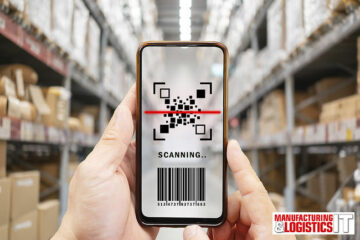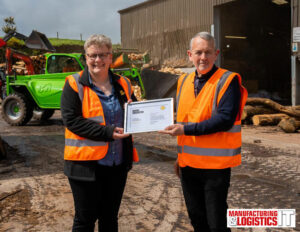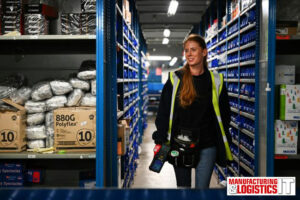Manufacturing and Supply Chain IT articles comprising case studies, product information, opinion articles, reports, new contract wins, product launches, opinion from the trade associations, government departments, research analysts, the vendor community. These articles are about specific industry IT solutions and topics relating to how improvements and efficiency gains can be made by the use of information technology within supply chain applications. All topics are covered in these articles which include ERP/MRP, Manufacturing Software, Advanced Planning, Demand Forecasting, Supply Chain Management, Warehouse Management Software, Automatic Identification/Datacapture, Voice-Directed Warehousing, Printing & Labelling, Transport Management, Asset Management Software and Mobile Computing.
Dec 20, 2023 <!--Comments (0)-->

Welcome to the December 2023 edition of Manufacturing & Logistics IT. In this issue we feature a Special Technology Report looking in depth at the latest developments in the world of Demand Forecasting & Planning solutions.
Also included is a ‘Cover Story’: Worldwide end-user spending on public cloud services is forecast to grow 20.4% to total US$678.8 billion in 2024, up from $563.6 billion in 2023, according to the latest forecast from Gartner, Inc.
Dec 20, 2023 <!--Comments (0)-->

By Stephen Dombroski, Director, Consumer Markets, QAD.
In today's dynamic business landscape, companies are continually striving to strike a balance between long-term strategic planning and short-term operational execution.
Dec 20, 2023 <!--Comments (0)-->

Cultural competency isn't just a valuable asset in logistics and manufacturing; it's the key that unlocks doors to international expansion. Global BPO firm, Acquire BPO’s, recent expansion to the US exemplifies the true value in cultural competency. Their expansion to Irving, TX is expected to bring more than 130 jobs to the region.
Dec 20, 2023 <!--Comments (0)-->

Unitechnik Systems GmbH will be presenting UniWare-AI, the AI-based assistant for logistics systems, at LogiMAT 2024. The AI tool will support the system integrator's customers in predicting order loads and bottlenecks in the material flow, for example.
Dec 20, 2023 <!--Comments (0)-->

In 2023, global events coupled with the cost of living crisis have motivated manufacturers across a range of industries to re-think their centralised production models.
Dec 20, 2023 <!--Comments (0)-->

Anton Eder, co-founder of global enterprise post-purchase software provider parcelLab, tackles what retailers should put in place to ensure a seamless experience for their customers. A quarter of businesses see 10 percent of orders experience a first attempt failed delivery. Failed deliveries cost so much more than money.
Dec 20, 2023 <!--Comments (0)-->

A manufacturer of spice products is forecast to double productivity and sales to £2m and create new jobs after investing in data and systems technologies, with the support of Made Smarter.
Logistics Information Technology News (LogisticsIT.com)
Logistics information technology (LIT) is the use of information technology (IT) to improve the efficiency and effectiveness of logistics operations. LIT encompasses a wide range of technologies, including:
- Barcoding and electronic data interchange (EDI): These technologies are used to automate the exchange of data between different parts of the supply chain.
- Warehouse management systems (WMS): These systems are used to track inventory levels, manage orders, and optimize the flow of goods in and out of warehouses.
- Transportation management systems (TMS): These systems are used to plan and track shipments, manage carriers, and optimize routes.
- Fleet management systems (FMS): These systems are used to track and monitor vehicles, manage fuel consumption, and improve driver safety.
- Geospatial technologies: These technologies are used to track the location of goods in real time and optimize delivery routes.
- Artificial intelligence (AI): AI is being used in logistics to automate tasks, improve decision-making, and optimize operations.
LIT can help logistics organizations to improve their performance in a number of ways, including:
- Increased efficiency: LIT can help to automate tasks, streamline processes, and improve communication between different parts of the supply chain. This can lead to significant reductions in costs and improved efficiency.
- Improved visibility: LIT can help to track the location of goods in real time and provide visibility into the entire supply chain. This can help to identify and resolve problems more quickly and improve customer satisfaction.
- Enhanced decision-making: LIT can help to provide decision-makers with real-time data and insights. This can help them to make better decisions about things like inventory levels, shipping routes, and pricing.
- SEO Powered Content & PR Distribution. Get Amplified Today.
- PlatoData.Network Vertical Generative Ai. Empower Yourself. Access Here.
- PlatoAiStream. Web3 Intelligence. Knowledge Amplified. Access Here.
- PlatoESG. Carbon, CleanTech, Energy, Environment, Solar, Waste Management. Access Here.
- PlatoHealth. Biotech and Clinical Trials Intelligence. Access Here.
- Source: https://www.logisticsit.com/articles/2023/12/20/beyond-borders-acquire-bpo’s-us-expansion-is-a-masterclass-in-cultural-competency
- :is
- $UP
- 10
- 125
- 13
- 130
- 19
- 20
- 2023
- 2024
- 22
- 23
- 26
- 27
- 28
- 32
- 39
- 3PL
- 41
- 8
- 80
- a
- About
- According
- acquire
- across
- additive
- additive manufacturing
- advanced
- After
- AI
- Analysts
- and
- Announcements
- applications
- ARE
- articles
- asset
- Assistance
- Assistant
- associations
- At
- attempt
- automate
- Balance
- BE
- being
- BEST
- Better
- between
- Beyond
- Billion
- borders
- bottlenecks
- bridging
- bring
- business
- Business Planning
- businesses
- button
- by
- Calendar
- CAN
- Capacity
- carriers
- case
- Case Studies
- centralised
- chain
- chains
- Cloud
- cloud services
- Co-founder
- collaboration
- collaborative
- COM
- comments
- Communication
- community
- Companies
- comprising
- conferences
- consumer
- consumption
- continually
- contract
- Cost
- Costs
- coupled
- covered
- create
- crisis
- CRM
- cultural
- customer
- Customer satisfaction
- Customers
- data
- December
- Decision Making
- decision-makers
- decisions
- Deliveries
- delivery
- Demand
- Demand forecasting
- departments
- depth
- description
- developments
- different
- direct
- Director
- distribution
- doors
- double
- driver
- dynamic
- edi
- edition
- effectiveness
- efficiency
- Electronic
- encompasses
- end
- Enhances
- ensure
- Enterprise
- Entire
- entry
- ERP
- Ether (ETH)
- events
- example
- exchange
- execution
- executive
- exemplifies
- Exhibitions
- expansion
- expected
- experience
- Failed
- Feature
- Firm
- First
- flow
- food
- For
- Forecast
- from
- Fuel
- Gains
- gap
- Gartner
- General
- Global
- GmBH
- goods
- Government
- Grow
- Have
- help
- How
- HTTPS
- identify
- image
- improve
- improved
- improvements
- in
- include
- included
- Including
- industries
- industry
- information
- information technology
- insights
- integrated
- Intelligence
- interchange
- International
- into
- inventory
- investing
- investment
- isn
- issue
- IT
- Jobs
- jpg
- just
- Keep
- Key
- Label
- Labels
- landscape
- latest
- latest developments
- launches
- lead
- Leadership
- levels
- like
- living
- loads
- location
- logistics
- long-term
- looking
- Lot
- made
- make
- manage
- management
- Manufacturer
- Manufacturers
- manufacturing
- Markets
- Masterclass
- material
- models
- money
- Monitor
- more
- motivated
- much
- New
- news
- number
- of
- on
- ONE
- OP
- operational
- Operations
- Opinion
- Optimize
- order
- orders
- organizations
- out
- parts
- percent
- performance
- pieces
- Place
- plan
- planning
- plato
- Plato Data Intelligence
- PlatoData
- position
- Post
- practice
- predicting
- Predictions
- pricing
- printing
- problems
- process
- processes
- processing
- Product
- Product information
- Production
- productivity
- Products
- provide
- provider
- public
- Public cloud
- put
- Quarter
- quickly
- range
- real
- real-time
- real-time data
- recent
- reductions
- region
- report
- Reports
- research
- resolve
- resource
- retail
- retailers
- Role
- routes
- s
- SaaS
- Safety
- sales
- satisfaction
- scheduling
- seamless
- see
- Services
- Shipping
- short-term
- should
- significant
- smarter
- So
- Software
- Solutions
- special
- specific
- Spending
- spice
- Stephen
- Strategic
- streamline
- strike
- striving
- studies
- Summits
- supply
- supply chain
- Supply Chain Execution
- supply chain management
- Supply chains
- support
- system
- Systems
- T
- Tackles
- TAG
- targets
- tasks
- tech
- Technologies
- Technology
- technology news
- than
- that
- The
- the world
- their
- Them
- then
- thermal
- These
- things
- third-party
- this
- thought
- thought leadership
- time
- to
- today
- tool
- Topics
- Total
- Traceability
- track
- trade
- true
- true value
- TX
- uncertainties
- unlocks
- URL
- us
- use
- used
- Valuable
- value
- Vehicles
- vendor
- visibility
- want
- Warehouse
- warehouse management
- Warehousing
- ways
- we
- What
- which
- wide
- Wide range
- will
- Wins
- with
- within
- WMS
- Work
- world
- worldwide
- Your
- zephyrnet













